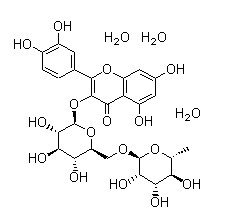Rutin
- Latin Name: Sophora japonica L.
- Synonyms: 3-[[6-O-(6-Deoxy-alpha-L-mannopyranosyl)-beta-D-glucopyranosyl]oxy]-2-(3,4-dihydroxyphenyl)-5,7-dihydroxy-4H-1-benzopyran-4-one; C.I. 75730
- Part of Used: Bud
- Specifications: 98%min
- Appearance: Light green yellow powder
- Application: Medicine,dietary supplement
Email: info@nutragreen.co.uk
| 153-18-4 |
|
| Molecular Formula |
C27H30O16.3(H2O) |
| Molecular Weight |
664.57 |
| Source |
Sophora japonica L. |
| Part |
Bud |
| Appearance |
Light green yellow powder |
| Dosage |
500-1000mg a day |
| Specification |
98%min |
| Main benefits |
prevent
vascular thrombosis |
| Applied industry |
Medicine, dietary supplement |
What is Rutin?
Rutin is also known as rutoside, quercetin-3-rutinoside and sophorin. It is a compound that is naturally produced in certain plants.
Rutin is a yellow crystalline flavonol glycoside (C27H30O16) that occurs in various plants (rue, tobacco, buckwheat, etc.). Upon hydrolysis (a chemical reaction that uses water to break down a compound), rutin yields quercetin and rutinose.
Molecular Structure:

Molecular Formula : C27H30O16.3(H2O)
Molecular Weight : 664.57
CAS Registry Number: 153-18-4
EINECS : 205-814-1
Benefits of taking Rutin supplements:
Rutin is used in many countries as a vasoprotectant and is an ingredient in numerous multivitamin preparations and herbal remedies. The rutosides are naturally occurring flavonoids that have documented effects on capillary permeability and edema (swelling) and have been used for the treatment of disorders of the venous and microcirculatory systems.
There is some evidence for the use of rutin
for chronic venous insufficiency, edema, hemorrhoids, microangiopathy (disease
of small blood vessels), varicosis and venous disorders. There are a number of
natural compounds that help to improve the structure of the vascular system
including vitamin C and the amino acids lysine and proline. Researchers
publishing in The Journal of Clinical Investigation describe the effect of a
compound called rutin, commonly found in fruits and vegetables and sold over
the counter as a dietary supplement that has been shown to inhibit the formation
of blood clots in an animal model of thrombosis.
Rutin
flavonoids prevent blood clots by inhibiting platelet aggregation
To conduct the study, researchers focused
on a protein called disulfide isomerase (PDI) which is found in all cells. Past
studies have shown that PDI is rapidly secreted from both platelets and
endothelial cells during thrombosis when a clot forms in a blood vessel, and
that inhibition of PDI could block thrombosis and prevent a fatal stroke or
heart attack. The scientists therefore developed a wide-scale search for a
natural agent capable of inhibiting the PDI protein and prevent vascular
thrombosis.
Researchers identified
quercetin-3-rutinoside (rutin), a bioflavonoid that is naturally found in many
fruits, vegetables and teas including onions, apples, and citrus fruits. The
scientists noted that "Rutin proved to be the most potently anti-thrombotic
compound that we ever tested", as the flavonoid was shown to inhibit both
platelet accumulation and fibrin generation during thrombus formation. Three to
five daily servings of rutin from dietary sources or supplementing with 500 mg
per day is shown to reduce platelet stickiness leading to blood clots and risk
of early death from stroke and heart attack.
Hemorrhoids
Hemorrhoids are caused from swollen veins in the anus. Rutin is used as a treatment for them.
Preliminary evidence suggests that
o-(beta-hydroxyethyl) rutosides and trihydroxyethylrutosides may be safe and
effective treatments for hemorrhoids. Studies investigating the effect of rutin
in different populations, as well as efficacy on third or fourth degree
hemorrhoids are warranted in future studies.
Skin
conditions
Some people bruise easily. Rutin is used to treat bruising of the skin.
In one clinical trial,
O-(beta-hydroxyethyl)-rutoside offered benefit in terms of skin irritation to
individuals with breast cancer undergoing radiation treatment.
Vitamin
C
Rutin also helps with the absorption of
Vitamin C, which is beneficial to collagen production.
Immunity
Being that rutin has antioxidants, it helps
to kill free radicals which, in turn, boosts immunity.
Circulation
Rutin can help improve circulation. One particular condition that this helps is varicose veins.
Schizophrenia
One well designed study suggests that O-[beta-hydroxyethyl]-rutosides may offer benefit in terms of schizophrenia.
Side effects and safety of Rutin
Rutins have been used effectively and
safely in several clinical and equivalence trials. Numerous reports have reported
no adverse side effects with rutin treatment. Laboratory findings were noted as
unchanged. Few adverse effects have been reported, most of which were mild or
transient. Rutin is possibly unsafe when taken in very high doses for long
periods of time.
It is general 500 mg doses taken 1 to 2 times
daily.
Company Information:
Nutragreen Biotechnology Co., Ltd, a brand of Shanghai Lvshang Biotech Co., Ltd, is a GMP compliant and FDA registered manufacturer and supplier of raw materials of plant extracts, botanicals, herbs, especially Tradtional Chinese herbs. Rutin is one of our most competitive ingredients with various specifications and stocks available all year round. You may leave a message below for more detailed information.





 facebook
facebook twitter
twitter linkedin
linkedin